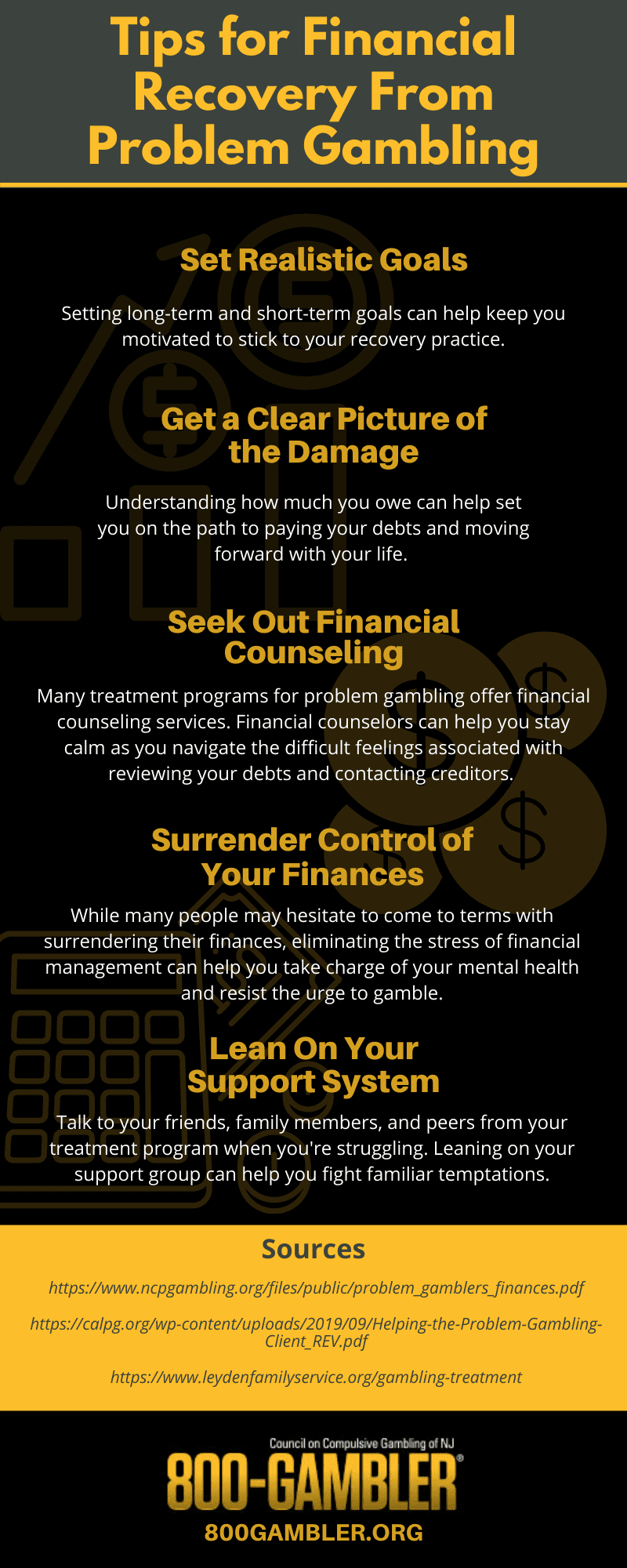Problem gambling can wreak havoc on your life and the lives of your loved ones, especially in a financial sense. Once you’re in recovery, you may not know where to start. A large part of moving forward into your recovery from problem gambling is taking charge of your financial well-being and dealing with the stressors you may have previously avoided.

Set Realistic Goals
When you’re overwhelmed with the current state of your life, it helps to reevaluate your goals and look at the big picture. Where do you want to be a year from now? Five years from now? Setting realistic goals for paying off your debts and gaining financial independence can restore your self-esteem and confidence. Creating a list of your goals can help you maintain the motivation to pay off your debt in increments.
Many people don’t take charge of their financial ruins until they’ve hit rock bottom, so if you’ve lost your home, maybe you would like to set the goal of owning your own home again. If you’ve depleted your savings account, perhaps you want to start with saving $100. Your list can include long-term and short-term goals.
Get a Clear Picture of the Damage
For many, assessing the damage done to their finances from problem gambling is a painful step. No matter how arduous this step is, it is crucial to get an honest and transparent assessment of what you need to do to get back on track. If you have a partner or family member who is willing to sort through your finances with you, it can help you remain calm and motivated to make the positive changes necessary to financially recover from debt.
If you’ve made a routine of borrowing money from friends, family, or coworkers, you must treat these instances of borrowed money with the same urgency as your other debts. Reminding your family and friends that you see them as a priority will help with rebuilding your relationships. Just like setting your goals, it will help to create a list of the debts you owe and check paid debts off as you go. Contact creditors and establish a payment schedule that works best for your budgetary restraints.
Seek Out Financial Counseling
Few people recover from problem gambling independently, and many people need to seek out formal treatment at the worst of their problem gambling behavior. The financial aspect of recovering from problem gambling may need as much attention as your mental health. For this reason, it’s a good idea to pursue financial counseling. Many treatment programs for problem gambling may include financial counseling services. In which case, take them up on it. Financial counselors can help you work through the earlier steps confidently and keep you calm as you address your problems head-on.
Surrender Control of Your Finances
In some cases, the best road to financial recovery means surrendering control of your finances until you are in a better position to manage them. Not having to navigate your finances can help alleviate stress and reduce the urge to gamble. Your financial counselor can help you choose the best person to take temporary control of your finances. Part of this process may include cutting up your credit cards and setting strict spending limits for yourself.
Lean on Treatment Program, Therapy, and Peers
Recovery is not a linear process, and you may find yourself caught off guard by the urge to gamble. In these moments, it’s essential to talk about your temptations in an open forum with people you trust and understand what you are going through. Keeping your difficult feelings to yourself will leave you vulnerable to slip-ups and relapses.
For more information about local resources for individuals struggling with problem gambling, reach out to our 24/7 call or text our helpline today!
Sources:
https://www.ncpgambling.org/files/public/problem_gamblers_finances.pdf
https://calpg.org/wp-content/uploads/2019/09/Helping-the-Problem-Gambling-Client_REV.pdf



